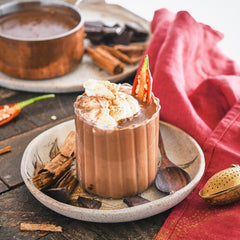Broccoli Nutrition Guide

Broccoli is basically a humble superstar. It's nutrient dense, easily available, and affordable - and in no way deserves the shade thrown its way.
Pumped With Iron
A single cup of broccoli provides as much as 6% of your daily recommended intake. And, because it's also high in Vitamin C, which helps the body actually absorb iron, it packs a double whammy. Accessible iron is an essential part of a plant-based diet, making broccoli even more important.
Magnesium Megastar
Magnesium plays a number of crucial roles in regulating healthy body functions. It's vital for the regulation of muscle and the nervous system, the promotion of bone and blood health, energy production and blood sugar levels. Making broccoli a supercharged inclusion in your everyday diet.
Gut Healthy Fibre
Broccoli may not be the first thing that comes to mind when you think gut health, but fibre plays an important role in preventing inflammation in the gut. The right kind of fibre can also help aid digestion and reduce constipation.
Vitamin K
Vitamin K is important when it comes calcium metabolism, and therefore bone health. It's also heavily implicated in maintaining good cardiovascular health. Most importantly, Vitamin K is essential to the process of blood clotting, the function that literally prevents us from bleeding to death, hence the Vitamin K injection that's routinely given to newborn babies in Australia.
Vitamin C
As mentioned above, broccoli is rich in Vitamin C, a potent antioxidant and immune booster, helping to fight off common virus causing the flu. Vitamin C also assists your body to absorb iron from iron rich plant-based foods (e.g. beans, chickpeas, lentils, and broccoli itself). This is particularly important for non-meat eaters, as including vegetables high in vitamin C with your meal can help your body absorb more iron.
Fun Fact
The word broccoli comes from a Latin word meaning branch, so those who call broccoli florets 'little trees' are really accidental classical scholars.














